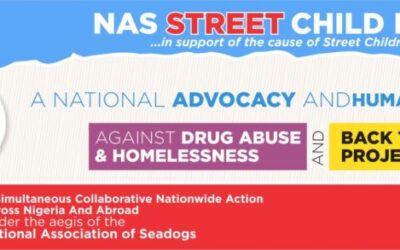As the world observes World Mental Health Day today, the National Association of Seadogs, Pyrates Confraternity joins all concerned stakeholders to amplify the awareness (as encapsulated in this year’s theme) that identifies the promotion and protection of the mental health of everyone as, not a privilege, but a fundamental human right. This right includes, but is not limited to, the right to protection from predisposing factors, the right to an acceptable standard of care that is easily accessible and available, and the right to privacy and inclusion in the community. The theme, “Mental Health is a Universal Human Right,” resonates deeply with our commitment to human rights, social justice, and the well-being of our society, and underscores the urgent need to address the critical issue of mental health, particularly in the context of Nigeria.
Nigeria, like many other countries, faces steep challenges in addressing mental health issues. Exactly one year ago via this same medium, we restated the very grim mental health statistics in Nigeria, which according to Dr Taiwo Obindo, President of the Association of Psychiatrists in Nigeria, had over 60 million people suffering from mental health illnesses, with only about 10% of them able to access appropriate care! According to the Clinical Psychiatrist, “we are left with more than 90% who are unable to access care, and this group is called the treatment gap for mental illness”. To make matters worse, stigma, misconceptions, and limited awareness contribute to the underreporting and neglect of mental health issues. The recent economic downturn has exacerbated the situation, leading to a distressing increase in mental health-related challenges, especially among the youth.
Recent reports by the United Nations project that Nigeria’s population will hit 238 million by mid-2023 call for all hands-on tackling the dangers posed by mental illnesses in our society. With an average age of 18, the country’s youthful population should be a valuable asset for its future, but the challenges they face, especially under the current economic climate, pose a serious threat to their mental health. Some of the factors that make young people in Nigeria a particularly vulnerable demographic include expectation disparities, unemployment pressures, limited access to quality education, social media pressure, stigma surrounding mental health, and inadequate mental health infrastructure. One alarming consequence of these economic challenges is the surge in suicide rates among Nigerian youths. The despair brought about by the listed factors has reached a critical point. It is a stark reminder that mental health concerns are not isolated issues but are intertwined with broader social and economic factors.
NAS/PC recognises that there are certain factors, including myths and traditional beliefs, which militate against the proper management of mental health illnesses in Nigeria. But, as a group, we continue to bemoan the disturbing shortage of mental health experts and facilities in Nigeria. Access to quality mental healthcare remains a luxury for many. The scarcity of professionals and treatment centres perpetuates the cycle of suffering and leaves countless individuals without the support they desperately need. With only a sprinkling of neuropsychiatric hospitals, and 200 practising psychiatrists attending to a 200 million population, the situation can be best described as dire. The International Centre for Investigative Reporting, in its report of October 2022, revealed that the number of psychiatrists in Nigeria reduced from around 300 in 2021 to about 200 one year ago. This amounts to one psychiatrist to 500,000 Nigerians, as against the globally recommended model of one psychiatrist to 10,000 patients.
As stakeholders from across a wide spectrum continue to chip in towards achieving the noble objective that is enunciated in this year’s commemoration theme, #NASPC urgently calls on governments at all levels in Nigeria to prioritise mental health in their policies and allocate adequate resources to establish and enhance mental health facilities. The establishment of crisis helplines and community-based support systems should be a priority. We also advocate that comprehensive mental health education programmes must be integrated into school curriculums and public awareness campaigns. Reducing stigma and fostering a culture of open dialogue are crucial steps towards building a mentally healthy society.
Increased investment in training and recruitment of mental health professionals is essential, including measures to stem the reignited brain drain epidemic stifling provision of quality healthcare. This includes psychiatrists, psychologists, counsellors, and community health workers who play a pivotal role in providing support and intervention.
We urge the private sector to collaborate with the government to bridge the gap in mental health services. Corporate entities can contribute by establishing Employee Assistance Programs (EAPs) and supporting mental health initiatives. We also encourage local leaders, religious institutions, and community organisations to actively engage in destigmatising mental health issues and creating safe spaces for engagement and support.
Finally, the media should use its influential platform to disseminate accurate information, raise awareness, and contribute positively to changing societal perceptions about mental health.
As an association committed to positive social change, we reaffirm our dedication to advocating for mental health as a universal human right. We stand united in the pursuit of a Nigeria where mental health is prioritised, and every citizen has access to the care they deserve.
Abiola Owoaje
NAS Capoon
Abuja


